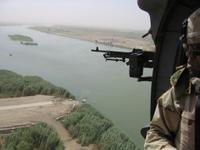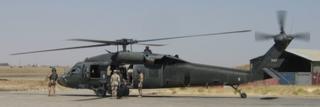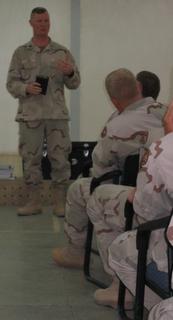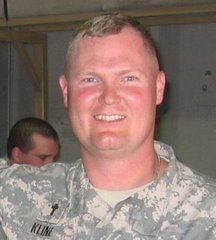This was our third and final visit. These soldiers have been  attached to our division and belong to the Idaho National Guard. (The patch they wear has a snake and a river, Idaho's Snake River being their symbol of choice.) As you might have guessed, they have a very high concentration of Latter-day Saint soldiers (some estimate there are over 1000), and I am the only Latter-day Saint chaplain in the division. Of course, the LDS soldiers don't need me in the same way other chaplains are needed by their dominations and traditions--as a complete lay ministry, LDS service members conduct their own services under the supervision of their unit chaplains. Before deploying, a few LDS soldiers were interviewed and set-apart (selected and blessed) to serve in such a leadership capacity. (The picture here is of us flying over the Tigris River, which flows throughout our area of operations.) My purposes for visiting these soldiers up north include:
attached to our division and belong to the Idaho National Guard. (The patch they wear has a snake and a river, Idaho's Snake River being their symbol of choice.) As you might have guessed, they have a very high concentration of Latter-day Saint soldiers (some estimate there are over 1000), and I am the only Latter-day Saint chaplain in the division. Of course, the LDS soldiers don't need me in the same way other chaplains are needed by their dominations and traditions--as a complete lay ministry, LDS service members conduct their own services under the supervision of their unit chaplains. Before deploying, a few LDS soldiers were interviewed and set-apart (selected and blessed) to serve in such a leadership capacity. (The picture here is of us flying over the Tigris River, which flows throughout our area of operations.) My purposes for visiting these soldiers up north include:
- ensuring LDS Group Leaders work closely with their unit chaplains
- counseling with LDS soldiers with exceptional challenges
- teaching and speaking words of encouragement to LDS soldiers
- meeting with their unit commanders and unit chaplains to ensure continued success

During our visits we have been greeted with overwhelming kindness, which increased with each visit. More than once I have thought that my feelings might be somewhat similar to the Apostle Paul's during his journeys. These soldiers are returning home soon, and although they will have missed the deer hunt--they are still looking forward to seeing their families.
A few of these soldiers were called home from their two-year, full-time, church missions to fulfill Individual Ready Reserve commitments and deploy to Iraq with their units, so they are anxious to redeploy to the states and to pick up their church missions where they left off. For others redeploying, there is the burden of finding new jobs to support their families. And then there are the few who have already returned home to recover from their injuries and wounds--and, of course, those who won't be joining them at all. Our brothers up north were planning memorial ceremonies for two soldiers they lost in the past week. These soldiers and their families' patriotic contributions inspire those of us who have the blessings of relative stability that active duty service provides; I am a better soldier for having been with them.
 During our five-day-trips up north to the Kirkuk area, Sundays are unusually challenging. Speaking in three sacrament meetings (Sunday services) and at a fireside (evening devotional), and fitting in counseling sessions between is exhausting--albeit richly rewarding! Although these units' chaplains are not LDS, they have developed a high regard for and brotherhood with their LDS soldiers. I was especially impressed with the brigade chaplain, Chaplain John Worster: a Catholic priest who has developed and maintained meaningful relationships with LDS leaders back in Idaho. During each of my visits I have attended the mass he conducts, and he once invited me to offer the readings from scripture--a real honor. Also, SGTs Farmer and Woodin are chaplain assistants who are LDS (but again, their chaplains are not), and they have been especially effective in helping us make the most of our time with them.
During our five-day-trips up north to the Kirkuk area, Sundays are unusually challenging. Speaking in three sacrament meetings (Sunday services) and at a fireside (evening devotional), and fitting in counseling sessions between is exhausting--albeit richly rewarding! Although these units' chaplains are not LDS, they have developed a high regard for and brotherhood with their LDS soldiers. I was especially impressed with the brigade chaplain, Chaplain John Worster: a Catholic priest who has developed and maintained meaningful relationships with LDS leaders back in Idaho. During each of my visits I have attended the mass he conducts, and he once invited me to offer the readings from scripture--a real honor. Also, SGTs Farmer and Woodin are chaplain assistants who are LDS (but again, their chaplains are not), and they have been especially effective in helping us make the most of our time with them.
These soldiers' experience is a bit different than ours. They work with the Kurds (and we with the Sunna or Sunni), who have a reputation for being more persistent. More of the oil that comes out of Iraq comes from their part of the country, so, generally, they are more wealthy (or less poor, as the case tends to be). Generally speaking, although always dangerous, combat up north is not as constant or as high profile as what we experience in the Tikrit, Samara, and Baji areas where we are.
These soldiers have been more casual--although still professional--in executing their missions. Many of these men carry themselves as if they were raised on a ranch or farm. I have seen many vehicles with Idaho or Utah state license plates wired to the frint of their vehicles. They have known one another for many years--some since kindergarten. It seems to be 10 degrees cooler; there are more trees, and it is greener and more pleasant. In fact, many of these soldiers have commented how much Kirkuk can remind them of being back home in Idaho, Utah or Wyoming--without the mountains, of course.

No comments:
Post a Comment